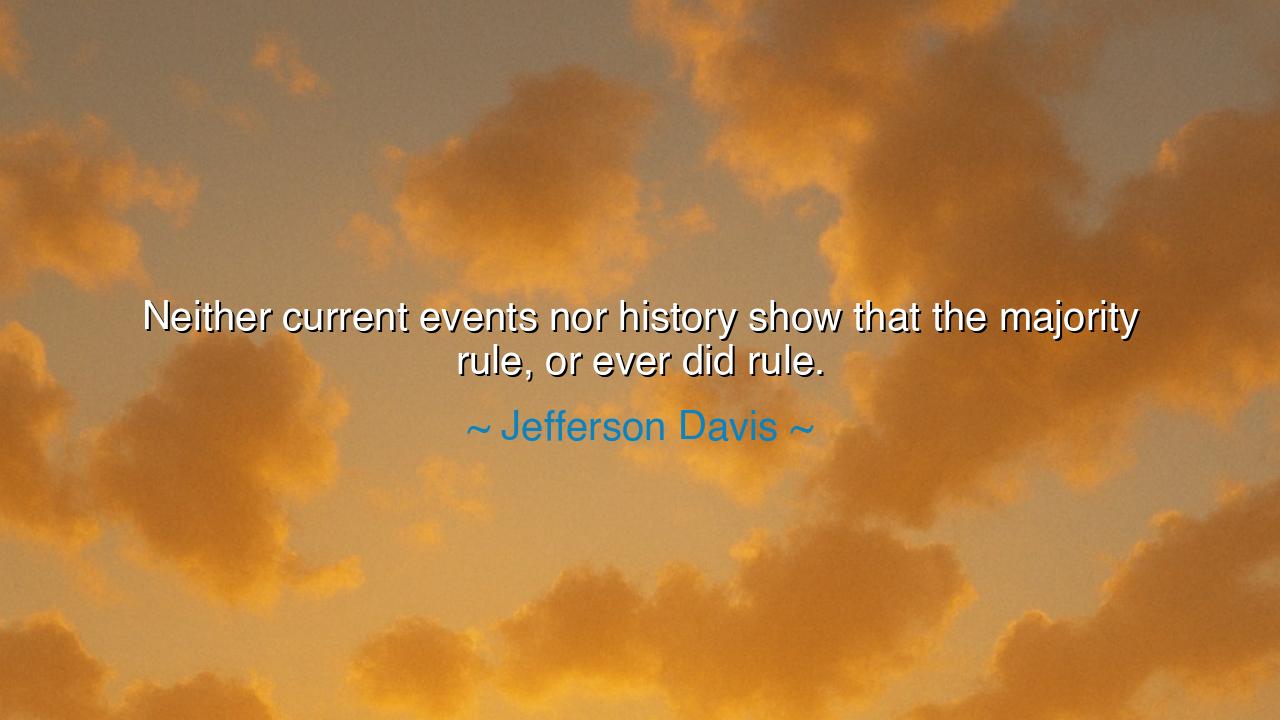
Neither current events nor history show that the majority rule






“Neither current events nor history show that the majority rule, or ever did rule.” – Jefferson Davis
Thus spoke Jefferson Davis, the complex and controversial figure who once led the Confederate States of America through the storm of civil war. His words, though born in the turbulence of the nineteenth century, reach beyond his own time and circumstance. They are not merely political—they are philosophical, a meditation on the nature of power and governance. In this saying, Davis contends that though democracy claims to serve the will of the majority, the record of both current events and history reveals a harsher truth: that it is rarely the many who rule, but the few—the influential, the cunning, the strong. His tone is neither hopeful nor idealistic; it is the cold observation of one who has watched the world too closely to be deceived by its slogans.
The origin of this thought lies in the contradictions of human society. From the dawn of civilization, nations have proclaimed the rule of the people, yet decisions have been shaped by elites, by wealth, by ambition. Davis, trained in the old traditions of politics and war, saw firsthand that behind the banners of liberty and equality there often stood a small circle of men who directed the fate of millions. Even in his own America, founded upon the promise of popular sovereignty, he saw corruption, manipulation, and the dominance of entrenched interests. His statement is not a rejection of democracy, but an unveiling of its illusions: that majority rule, while noble in theory, has rarely governed the earth in truth.
History bears witness to his claim. Consider ancient Rome, the republic that promised power to the Senate and the people. Yet behind the façade of civic participation, the decisions of empire were made by a handful of patricians—aristocrats who controlled the legions, the treasury, and the minds of the masses. When the Republic fell and Augustus crowned himself emperor, the people still cheered, believing they had chosen him. But in truth, the majority never ruled; they were guided, persuaded, or deceived by those who understood power more deeply than they did. So it has been in every age: the names of the rulers change, but the structure of influence remains.
Even in modern times, Davis’s words echo. The majority may vote, but their choices are often shaped by forces unseen—by wealth, by propaganda, by fear, by hope. In every society, a minority of leaders, thinkers, and manipulators hold the levers of power. They frame the debate, define the truth, and direct the passions of the crowd. The people, believing they act freely, often move according to the designs of others. This is not to despise democracy, but to recognize its fragility. For democracy is not a natural state—it is a discipline of constant vigilance, and without wisdom, the many can easily be swayed by the few.
And yet, though Davis’s words reveal a cynical wisdom, they also carry a warning that should awaken rather than dishearten. If the majority has seldom ruled, it is not because they are unworthy, but because they have forgotten their strength. Throughout history, there have been moments—rare and radiant—when ordinary people have risen to claim their power. The American Revolution, the abolitionist movement, the struggles for civil rights—all were born when the silent many refused to remain silent. These were the moments when history trembled, when the will of the people broke through the barriers built by privilege and fear. Davis’s observation, then, is not a curse upon humanity, but a mirror showing what happens when the people cease to watch, to think, to act.
For the lesson is clear: power is not given—it is taken, it is maintained, and it must be guarded. The majority can rule only when they are educated, united, and awake. If they surrender their thought to demagogues, their will to indifference, or their courage to comfort, then they become subjects once more, ruled by the few who understand what they have forgotten. The ancients knew this well. As Aristotle wrote, “The price of freedom is eternal vigilance.” Davis’s grim reflection and Aristotle’s warning are but two sides of the same coin. Both remind us that liberty without awareness is an illusion, and that the people who neglect to guard their rights will one day awaken to find them gone.
So, O listener of these truths, take heed of the wisdom and the warning in Davis’s words. “Neither current events nor history show that the majority rule”—yet history also shows that they could, if they would. Remember that democracy is not a gift but a flame, one that must be tended by the hearts of the many. Study your history, for it reveals the patterns of power. Question those who claim to speak for you. Think, speak, and act with courage, for silence is the ally of tyranny. Let your generation be the one that breaks the pattern, the one that proves that the majority not only dreams of justice but learns at last how to rule by wisdom. For though Davis spoke with disillusion, the story of mankind is not yet finished—and the next chapter is still yours to write.






AAdministratorAdministrator
Welcome, honored guests. Please leave a comment, we will respond soon